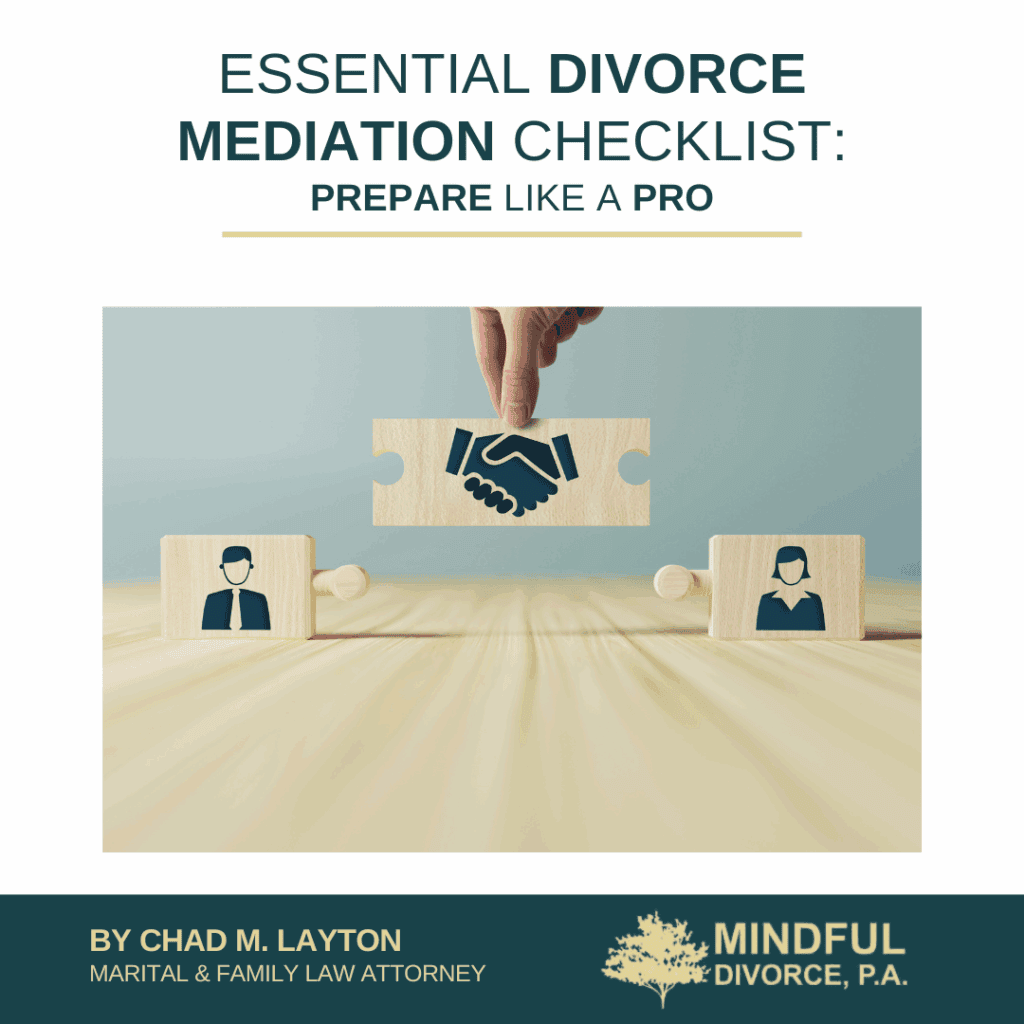
Divorce can feel like juggling flaming torches while blindfolded, yet solid preparation turns that firestorm into something manageable. An organized checklist helps you walk into mediation knowing what to say, what to bring, and how to protect your finances and family.
At Mindful Divorce, P.A., we focus on fixed-fee services, so you know the cost upfront and can keep your attention on planning for a calmer future. This guide hands you a clear, practical roadmap for divorce mediation in Florida, letting you prepare with confidence instead of guesswork.
What is Divorce Mediation?
Mediation is a conversation guided by a neutral professional who helps both spouses reach an agreement on issues such as property division, parenting plans, and support. Instead of sparring in court, you work through solutions together in a private setting. Because Florida courts often require mediation before a trial date is granted, coming prepared saves time and legal fees while giving you more control over the results.
Before moving to the checklist itself, let’s pause to remember why organization matters. A well-prepared spouse can present numbers, documents, and thoughtful proposals on the spot, reducing frustration and keeping talks productive.
Divorce Mediation Checklist: Key Areas to Cover
Think of the checklist as a navigation app, guiding you step by step so nothing slips through the cracks. Below, we break it into five focus areas, each with practical actions you can start today.
Financial Preparation
Money questions often stall mediation, yet solid paperwork speeds everything along. Work through the following items before your first session:
- Make a complete inventory of assets and debts, including bank accounts, brokerage funds, real estate, vehicles, credit cards, medical bills, and personal loans.
- Collect the last three to five years of tax returns, plus recent statements from banks, credit cards, retirement plans, and existing loans.
- Draft a realistic post-divorce budget listing projected income, housing, utilities, child-related costs, insurance, and retirement contributions.
- Calculate potential spousal support by comparing earnings, work history, and the length of the marriage.
- Research any retirement plans that may need a Qualified Domestic Relations Order so you avoid delays after mediation.
- Print recent credit reports for both spouses, then flag joint accounts that need to be closed or refinanced.
Emotional Preparation
Even the best documents will not help if anger hijacks the conversation. Plan ahead for your mental health:
- Recognize the emotional stages of divorce, and remind yourself that fear or resentment often fades once negotiations start moving.
- Schedule regular check-ins with a counselor, peer group, or trusted friend to vent outside the mediation room.
- Keep up healthy routines such as walking, balanced meals, and enough sleep so stress does not derail your focus.
- Practice short breathing exercises you can use in the hallway if discussions become tense.
Child-Related Matters
Florida courts look at the child’s best interests first, so come ready with thoughtful proposals:
- Outline a parenting plan covering school nights, weekends, holidays, travel, and decision-making about education and health care.
- Gather documents such as birth certificates, report cards, medical records, and extracurricular schedules.
- Use Florida’s Child Support Guidelines worksheet to estimate support based on income, health insurance, and time sharing.
- List any specific needs or upcoming expenses, for example tutoring or orthodontics, and suggest cost-sharing solutions.
Legal and Procedural Steps
Staying on top of paperwork keeps your case moving:
- Hire a divorce attorney for legal advice, even if that lawyer attends mediation only as a coach.
- Interview mediators and choose one whose style fits your communication approach.
- Review the basic flow of mediation sessions so surprises are minimized.
- Bring filed court documents, including the petition, response, and any temporary orders, in a labeled folder.
Logistics and Practical Considerations
Small planning details prevent last-minute hiccups on mediation day:
- Confirm the exact start time, parking options, and building security requirements.
- Clarify mediator fees and payment methods, then decide in advance how you and your spouse will split the cost.
- Pack an “essentials kit” with pens, paper, a calculator, snacks, a water bottle, and a phone charger.
- Write a quick bullet list of your top discussion points so nothing is overlooked during lengthy talks.
Common Challenges in Divorce Mediation and How to Address Them
Even when you prepare well, certain obstacles appear over and over. Recognizing them early gives you a better chance of staying on track.
Emotional Turbulence
If a discussion starts sliding into blame, pause and remember the shared goal of fair resolution. Talking with a therapist between sessions often provides the release valve you need to keep negotiations civil.
Communication Breakdown
Use “I” statements and ask clarifying questions instead of jumping to conclusions. A good mediator may suggest taking turns speaking for a set time so both voices are heard.
Unresolved Issues from the Relationship
Save past arguments for a counseling room, not the mediation table. Keep notes on immediate decisions about property, support, and parenting; everything else can wait.
Power Imbalances
If one spouse tends to dominate, ask the mediator for separate caucus meetings. Also, having your attorney nearby helps level the field.
Difficulty Agreeing on Child Custody and Visitation
Redirect the focus to the children’s routines and developmental needs rather than parental preferences. Remind each other that unresolved custody fights often end with a judge deciding for you.
Ready to Move Forward with Peace of Mind? Contact Us Today
Divorce mediation rewards preparation, calm communication, and solid legal guidance. If you would like help organizing documents, crafting parenting plans, or simply understanding your options, reach out to Mindful Divorce, P.A., for a fixed-fee consultation. Call us at 561-537-8227 or visit our Contact Us page to book time with our team. Let us help you turn that checklist into a clear path toward a brighter chapter.



